Depression抑郁症英语presentation
- 格式:ppt
- 大小:33.32 MB
- 文档页数:36
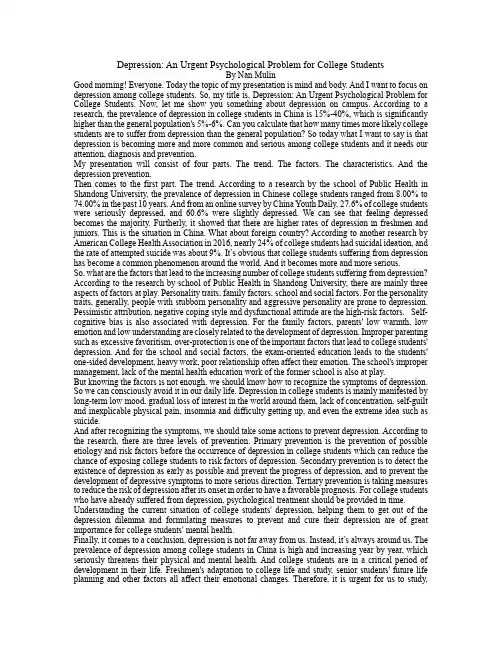
Depression: An Urgent Psychological Problem for College StudentsBy Nan MulinGood morning! Everyone. Today the topic of my presentation is mind and body. And I want to focus on depression among college students. So, my title is, Depression: An Urgent Psychological Problem for College Students. Now, let me show you something about depression on campus. According to a research, the prevalence of depression in college students in China is 15%-40%, which is significantly higher than the general population's 5%-6%. Can you calculate that how many times more likely college students are to suffer from depression than the general population? So today what I want to say is that depression is becoming more and more common and serious among college students and it needs our attention, diagnosis and prevention.My presentation will consist of four parts. The trend. The factors. The characteristics. And the depression prevention.Then comes to the first part. The trend. According to a research by the school of Public Health in Shandong University, the prevalence of depression in Chinese college students ranged from 8.00% to 74.00% in the past 10 years. And from an online survey by China Youth Daily, 27.6% of college students were seriously depressed, and 60.6% were slightly depressed. We can see that feeling depressed becomes the majority. Furtherly, it showed that there are higher rates of depression in freshmen and juniors. This is the situation in China. What about foreign country? According to another research by American College Health Association in 2016, nearly 24% of college students had suicidal ideation, and the rate of attempted suicide was about 9%. It’s obvious that college students suffering from depression has become a common phenomenon around the world. And it becomes more and more serious.So, what are the factors that lead to the increasing number of college students suffering from depression? According to the research by school of Public Health in Shandong University, there are mainly three aspects of factors at play. Personality traits, family factors, school and social factors. For the personality traits, generally, people with stubborn personality and aggressive personality are prone to depression. Pessimistic attribution, negative coping style and dysfunctional attitude are the high-risk factors.Self-cognitive bias is also associated with depression. For the family factors, parents' low warmth, low emotion and low understanding are closely related to the development of depression. Improper parenting such as excessive favoritism, over-protection is one of the important factors that lead to college students' depression. And for the school and social factors, the exam-oriented education leads to the students' one-sided development, heavy work, poor relationship often affect their emotion. The school's improper management, lack of the mental health education work of the former school is also at play.But knowing the factors is not enough, we should know how to recognize the symptoms of depression. So we can consciously avoid it in our daily life. Depression in college students is mainly manifested by long-term low mood, gradual loss of interest in the world around them, lack of concentration, self-guilt and inexplicable physical pain, insomnia and difficulty getting up, and even the extreme idea such as suicide.And after recognizing the symptoms, we should take some actions to prevent depression. According to the research, there are three levels of prevention. Primary prevention is the prevention of possible etiology and risk factors before the occurrence of depression in college students which can reduce the chance of exposing college students to risk factors of depression. Secondary prevention is to detect the existence of depression as early as possible and prevent the progress of depression, and to prevent the development of depressive symptoms to more serious direction. Tertiary prevention is taking measures to reduce the risk of depression after its onset in order to have a favorable prognosis.For college students who have already suffered from depression, psychological treatment should be provided in time. Understanding the current situation of college students' depression, helping them to get out of the depression dilemma and formulating measures to prevent and cure their depression are of great importance for college students' mental health.Finally, it comes to a conclusion, depression is not far away from us. Instead, it’s always around us. The prevalence of depression among college students in China is high and increasing year by year, which seriously threatens their physical and mental health. And college students are in a critical period of development in their life. Freshmen's adaptation to college life and study, senior students' future life planning and other factors all affect their emotional changes. Therefore, it is urgent for us to study,diagnose and prevent depression, promote the healthy growth of college students' mental health. And this needs our joint efforts.That’s all, thank you!。
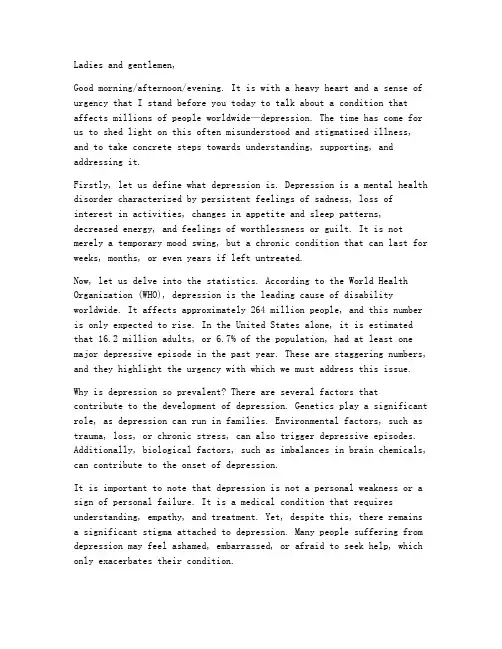
Ladies and gentlemen,Good morning/afternoon/evening. It is with a heavy heart and a sense of urgency that I stand before you today to talk about a condition that affects millions of people worldwide—depression. The time has come for us to shed light on this often misunderstood and stigmatized illness, and to take concrete steps towards understanding, supporting, and addressing it.Firstly, let us define what depression is. Depression is a mental health disorder characterized by persistent feelings of sadness, loss of interest in activities, changes in appetite and sleep patterns, decreased energy, and feelings of worthlessness or guilt. It is not merely a temporary mood swing, but a chronic condition that can last for weeks, months, or even years if left untreated.Now, let us delve into the statistics. According to the World Health Organization (WHO), depression is the leading cause of disability worldwide. It affects approximately 264 million people, and this number is only expected to rise. In the United States alone, it is estimated that 16.2 million adults, or 6.7% of the population, had at least one major depressive episode in the past year. These are staggering numbers, and they highlight the urgency with which we must address this issue.Why is depression so prevalent? There are several factors thatcontribute to the development of depression. Genetics play a significant role, as depression can run in families. Environmental factors, such as trauma, loss, or chronic stress, can also trigger depressive episodes. Additionally, biological factors, such as imbalances in brain chemicals, can contribute to the onset of depression.It is important to note that depression is not a personal weakness or a sign of personal failure. It is a medical condition that requires understanding, empathy, and treatment. Yet, despite this, there remains a significant stigma attached to depression. Many people suffering from depression may feel ashamed, embarrassed, or afraid to seek help, which only exacerbates their condition.So, what can we do to combat this stigma and help those affected by depression? Here are some suggestions:1. Educate ourselves: By understanding the signs and symptoms of depression, we can recognize it in ourselves and others. This knowledge is the first step towards addressing the issue.2. Speak openly: It is crucial to talk about depression, just as wewould with any other medical condition. Open dialogue can help break down the stigma and encourage those suffering to seek help.3. Support those affected: Be there for friends, family, and colleagues who may be struggling with depression. Offer a listening ear, understanding, and, if necessary, encourage them to seek professional help.4. Encourage professional help: If someone you know is suffering from depression, encourage them to seek help from a mental health professional. Treatment can vary from therapy to medication, and a professional can help determine the best approach for each individual.5. Advocate for mental health: Advocate for better access to mental health services, more research into depression, and policies thatsupport those with mental health conditions.In conclusion, depression is a serious and widespread issue thatrequires our attention. By educating ourselves, speaking openly, supporting those affected, encouraging professional help, and advocating for mental health, we can take significant steps towards addressing this illness. Let us not underestimate the power of compassion, understanding, and action. Together, we can create a world where depression is treated with the same urgency and care as any other medical condition.Thank you for your time and attention. Let us work together to create a healthier, more supportive, and understanding society for all.。


Depression is the leading cause of disability in the world, in the United States, close to ten percent of adults struggle with depression. But because it's a mental illness, it can be a lot harder to understand than, say, high cholesterol.抑郁症是造成全球残疾类疾病的主要原因。
在美国,大约有10%的成年人被抑郁症所困扰。
但是作为一种精神疾病,抑郁症比类似高胆固醇等概念更难被理解。
One major source of confusion is the difference between having depression and just feeling depressed. almost everyone feels down from time to time, getting a bad grade, losing a job, having an argument, even a rainy day can bring on feelings of sadness.其中最容易被混淆的概念在于区分患有抑郁症与只是简单的情绪低落。
几乎所有的人都有情绪低落的时候。
考试失利,被解雇,与人发生争执,甚至只是雨天都有可能导致情绪低落。
Sometimes there's no trigger at all. It just pops up out of the blue. Then circumstances change, and those sad feelings disappear. Clinical depression is different, it's a medical disorder, and it won't go away just because you want it to. It lingers for at least two consecutive weeks, and significantly interferes with one's ability to work, play or love.有时可能根本就是没有由头的消沉。

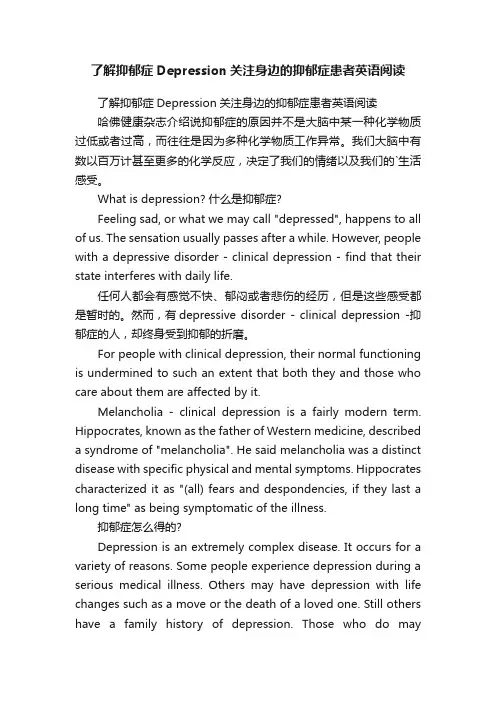
了解抑郁症Depression关注身边的抑郁症患者英语阅读了解抑郁症Depression关注身边的抑郁症患者英语阅读哈佛健康杂志介绍说抑郁症的原因并不是大脑中某一种化学物质过低或者过高,而往往是因为多种化学物质工作异常。
我们大脑中有数以百万计甚至更多的化学反应,决定了我们的情绪以及我们的`生活感受。
What is depression? 什么是抑郁症?Feeling sad, or what we may call "depressed", happens to all of us. The sensation usually passes after a while. However, people with a depressive disorder - clinical depression - find that their state interferes with daily life.任何人都会有感觉不快、郁闷或者悲伤的经历,但是这些感受都是暂时的。
然而,有depressive disorder - clinical depression -抑郁症的人,却终身受到抑郁的折磨。
For people with clinical depression, their normal functioning is undermined to such an extent that both they and those who care about them are affected by it.Melancholia - clinical depression is a fairly modern term. Hippocrates, known as the father of Western medicine, described a syndrome of "melancholia". He said melancholia was a distinct disease with specific physical and mental symptoms. Hippocrates characterized it as "(all) fears and despondencies, if they last a long time" as being symptomatic of the illness.抑郁症怎么得的?Depression is an extremely complex disease. It occurs for a variety of reasons. Some people experience depression during a serious medical illness. Others may have depression with life changes such as a move or the death of a loved one. Still others have a family history of depression. Those who do mayexperience depression and feel overwhelmed with sadness and loneliness for no known reason.What Are the Main Causes of Depression?诱发抑郁症的主要原因There are a number of factors that may increase the chance of depression, including the following:Abuse. 虐待Past physical, sexual, or emotional abuse can cause depression later in life.Certain medications. 某些药物 Some drugs, such as Accutane (used to treat acne), the antiviral drug interferon-alpha, and corticosteroids, can increase your risk of depression.Conflict. 争吵(人际关系困扰) Depression in someone who has the biological vulnerability to develop depression may result from personal conflicts or disputes with family members or friends.Death or a loss.丧亲 Sadness or grief from the death or loss of a loved one, though natural, may increase the risk of depression.Genetics.遗传 A family history of depression may increase the risk. Its thought that depression is a complex trait that may be inherited across generations, although the genetics of psychiatric disorders are not as simple or straightforward as in purely genetic diseases such as Huntingtons chorea or cystic fibrosis.Major events.重大事件 Even good events such as starting a new job, graduating, or getting married can lead to depression. So can moving, losing a job or income, getting divorced, or retiring.Other personal problems.其他个人困扰Problems such as social isolation due to other mental illnesses or being cast out of a family or social group can lead to depression.Serious illnesses.严重疾病Sometimes depression co-exists with a major illness or is a reaction to the illness.Substance abuse.滥用药物等Nearly 30% of people with substance abuse problems also have major or clinical depression.What causes depression?Nobody is sure what causes depression. Experts say depression is caused by a combination of factors, such as the persons genes, their biochemical environment, personal experience and psychological factors.抑郁症的起因很复杂,很难有确切的定论。

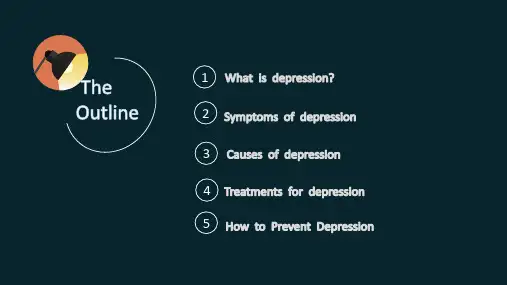
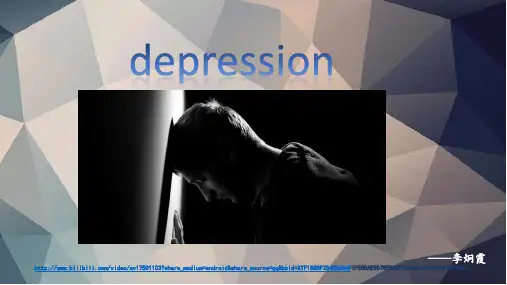

抑郁症的专业词汇一、“Depression”([dɪˈpreʃn],名词)1. 释义。
- 这是“抑郁症”最常见的英语词汇表达。
它还可以表示“沮丧;消沉;经济大萧条(时期)”等意思。
在医学领域,专门指抑郁症这种精神疾病。
- 例如:He suffers from depression.(他患有抑郁症。
)二、“Major Depressive Disorder”([ˈmeɪdʒə(r) dɪˈpresɪv dɪsˈɔːdə(r)],名词短语)1. 释义。
- 即“重度抑郁症”,是一种比较严重的抑郁症类型。
其中“major”表示“主要的;严重的”,“disorder”表示“紊乱;失调;疾病”。
- 例如:Major Depressive Disorder can seriously affect a person's daily life.(重度抑郁症会严重影响一个人的日常生活。
)三、“Melancholia”([ˌmelənˈkəʊliə],名词)1. 释义。
- 这个词也有“抑郁症”的意思,比较偏书面、医学专业术语。
它还可表示“忧郁;忧郁症”的状态。
- 例如:The symptoms of melancholia include persistent sadness.(抑郁症的症状包括持续的悲伤。
)四、“Anhedonia”([ˌænhiːˈdəʊniə],名词)1. 释义。
- 在抑郁症相关概念里,指“快感缺乏”,即患者难以从通常令人愉悦的活动中体验到快乐。
- 例如:Anhedonia is one of the common symptoms in depression.(快感缺乏是抑郁症的常见症状之一。
)五、“Dysphoria”([dɪsˈfɔːriə],名词)1. 释义。
- 表示“烦躁不安;焦虑;病理性心境恶劣”,也是抑郁症患者可能出现的情绪状态。
- 例如:The patient with depression often experiences dysphoria.(抑郁症患者经常经历烦躁不安的情绪。
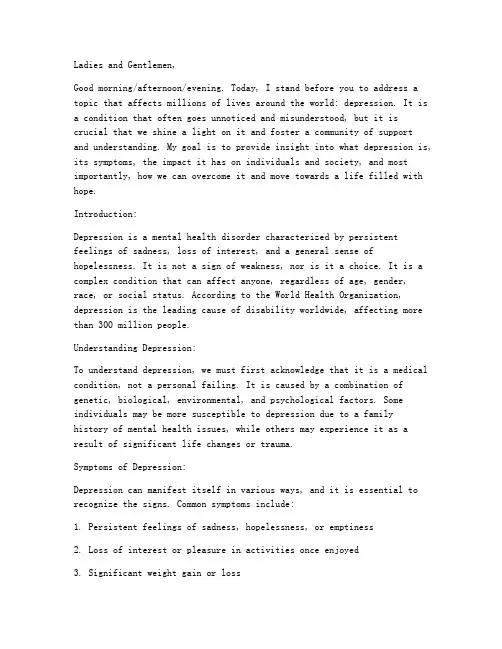
Ladies and Gentlemen,Good morning/afternoon/evening. Today, I stand before you to address a topic that affects millions of lives around the world: depression. It is a condition that often goes unnoticed and misunderstood, but it iscrucial that we shine a light on it and foster a community of supportand understanding. My goal is to provide insight into what depression is, its symptoms, the impact it has on individuals and society, and most importantly, how we can overcome it and move towards a life filled with hope.Introduction:Depression is a mental health disorder characterized by persistent feelings of sadness, loss of interest, and a general sense of hopelessness. It is not a sign of weakness, nor is it a choice. It is a complex condition that can affect anyone, regardless of age, gender, race, or social status. According to the World Health Organization, depression is the leading cause of disability worldwide, affecting more than 300 million people.Understanding Depression:To understand depression, we must first acknowledge that it is a medical condition, not a personal failing. It is caused by a combination of genetic, biological, environmental, and psychological factors. Some individuals may be more susceptible to depression due to a familyhistory of mental health issues, while others may experience it as a result of significant life changes or trauma.Symptoms of Depression:Depression can manifest itself in various ways, and it is essential to recognize the signs. Common symptoms include:1. Persistent feelings of sadness, hopelessness, or emptiness2. Loss of interest or pleasure in activities once enjoyed3. Significant weight gain or loss4. Insomnia or oversleeping5. Fatigue or loss of energy6. Feelings of worthlessness or excessive guilt7. Difficulty concentrating, remembering, or making decisions8. Recurrent thoughts of death, suicidal ideation, or suicide attemptsThe Impact of Depression:Depression has far-reaching consequences for individuals and society. It can affect one's ability to work, maintain relationships, and enjoy life. Moreover, depression is linked to other health conditions, such as heart disease, diabetes, and chronic pain. The economic burden of depressionis immense, with lost productivity and increased healthcare costs.Breaking the Stigma:One of the most significant barriers to overcoming depression is the stigma associated with it. Many individuals suffering from depressionfeel ashamed or afraid to seek help, which only exacerbates their condition. It is essential to challenge these misconceptions and promote a culture of empathy, compassion, and support.Seeking Help:The first step in overcoming depression is to seek help. This mayinvolve talking to a healthcare professional, such as a psychologist, psychiatrist, or general practitioner. They can provide a diagnosis, recommend appropriate treatments, and offer guidance on managing symptoms. Treatment options may include medication, therapy, lifestyle changes, and support groups.Overcoming Depression:Overcoming depression is a journey that requires patience, perseverance, and resilience. Here are some strategies that can help:1. Establish a routine: Consistency can bring a sense of control and normalcy to your life.2. Exercise regularly: Physical activity releases endorphins, which can improve your mood and energy levels.3. Maintain a healthy diet: Eating a balanced diet can support your overall well-being and improve your mood.4. Practice mindfulness: Mindfulness techniques, such as meditation and deep breathing, can help reduce stress and promote relaxation.5. Build a support network: Reach out to friends, family, or support groups to share your experiences and receive encouragement.6. Set realistic goals: Break down your goals into manageable steps and celebrate your progress along the way.Conclusion:Depression is a challenging condition, but it is not insurmountable. By understanding its nature, seeking help, and adopting strategies to cope with its symptoms, individuals can overcome depression and reclaim their lives. It is crucial that we continue to raise awareness about this disorder, break the stigma, and provide support to those who are affected.In conclusion, let us join hands in this fight against depression. Let us foster a community that embraces compassion, empathy, and understanding. Together, we can create a world where individuals affected by depression can find the strength to face their challenges and move towards a life filled with hope.Thank you.。
英语抑郁演讲稿As we all know, depression is a common yet serious medical illness that negatively affects how we feel, think, and act. It causes feelings of sadness and/or a loss of interest in activities once enjoyed. It can lead to a variety of emotional and physical problems and can decrease a person's ability to function at work and at home. Today, I want to talk about depression in the context of the English language and how it can affect our ability to communicate effectively.First and foremost, it's important to acknowledge that depression can have a significant impact on our language skills. When we are feeling depressed, it can be difficult to find the right words to express ourselves. Our thoughts may become jumbled, and we may struggle to articulate our feelings and ideas. This can be particularly challenging when it comes to speaking or writing in English, especially for non-native speakers. The added pressure of trying to communicate in a second language while dealing with depression can exacerbate feelings of frustration and isolation.In addition to the linguistic challenges, depression can also affect our motivation to engage with the English language. Language learning requires a certain level of energy and enthusiasm, both of which can be in short supply when we are struggling with depression. It can be hard to muster the motivation to practice speaking, reading, or writing in English when our mental health is suffering. This can lead to a decline in language skills and a sense of stagnation in our language learning journey.Furthermore, depression can impact our ability to connect with others through the English language. Effective communication is not just about grammar and vocabulary;it's also about conveying emotions and building meaningful connections with others. When we are feeling depressed, it can be challenging to engage in authentic, open communication. We may struggle to express empathy, understanding, and warmth in our interactions with others, which can hinder our ability to build relationships and connect with English-speaking communities.In conclusion, depression can have a profound impact on our language skills, motivation to engage with the English language, and our ability to connect with others through English. It's important to recognize the ways in which depression can affect our language learning and communication, and to seek support and resources to help manage these challenges. By acknowledging the impact of depression on our language abilities, we can work towards developing strategies and coping mechanisms to navigate these difficulties and continue to grow and thrive in our language learning journey. Thank you.。